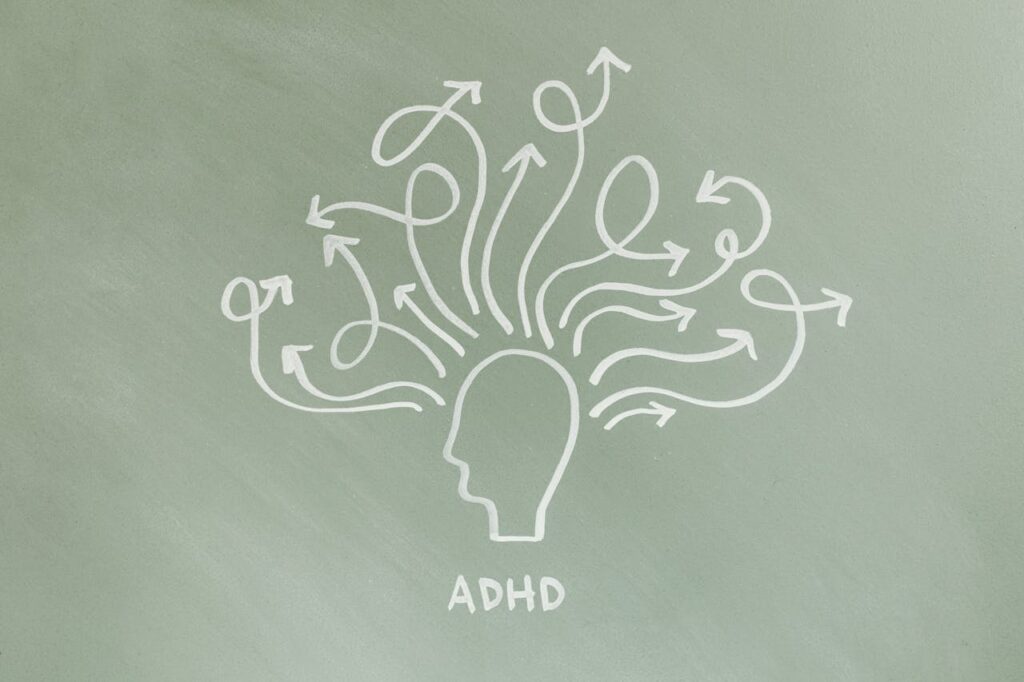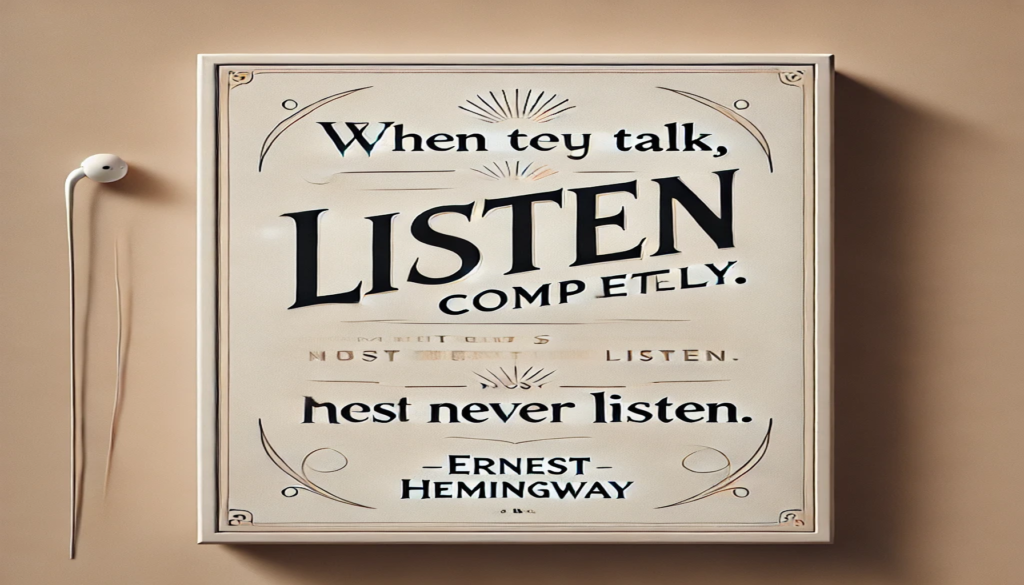
Table of Contents
Introduction
With distraction everywhere, genuine human contact can often be a luxury. Yet, the key to meaningful relationship-building as well as affectingive dialogue is a skill many ignore—active listening. Effective listening turns from listening to words to being fully present with empathy, involvement, and engagement in the communication process. Active listening not only makes your listening skills better but also improves your communication skills and leads to effective communication, creating better personal and professional bonds.
This blog will explore the heart of active listening, its importance, techniques to master it, and how it can blossom in transforming relationships and conversations.
Understanding Active Listening
Active listening is fully concentrating, understanding, responding, and remembering what someone is saying. It involves an intentional effort to go beyond just listening to hear, to really understand the message of the speaker, both verbal and nonverbal.
Key Components of Listening
Full Attention: Be attentive to the speaker without any side distractions.
Empathy: Both feeling and sharing others’ feelings, encourages empathetic listening
Nonverbal Cues: Pay attention to body language, tone, facial expressions.
Clarification and Feedback: Ask questions; paraphrase to verify understanding
Why is Active Listening Important
Improves Communication Skills
It is the foundation for effective two-way communication. When you truly listen, you understand nuances, address concerns, and minimize misunderstandings. This skill is very important in any professional setup since proper communication mostly dictates how well things will go.
Enhances Trust and Empathy
People feel valued and respected when they are genuinely heard. In any case, empathetic listening strengthens relationships by showing compassion and interest in the perspective of the other person.
Encourages Effective Problem-Solving
By carefully comprehending other people’s perspectives, you realize more insight that can help in working out even better solutions. This is very helpful in conflict resolution and team collaborations.
Strengthens Relationships
Open and respectful communication in both personal and professional life is what makes relationships thrive. Active listening helps bridge the gaps, resolves conflicts, and builds stronger connections.
Science Behind Active Listening
Research proves that active listening is a transformative activity:

Improved Cognitive Engagement: Active listening involves multiple parts of the brain tied to empathy, memory, and decision-making.
Emotional Regulation: Listening without judgment helps to regulate emotions in the process of discussing something.
Increased Productivity: With active listening in a workplace, it increases teamwork and reduces errors, thus increasing productivity.
How to Develop Effective Active Listening
1. Mindful Presence
Set aside distractions such as cell phones or loud noise.
Practice mindfulness to listen actively.
2. Nonverbal Communication
Maintain eye contact to demonstrate your attention.
Nod or use facial expression to acknowledge the understanding.
Subtly mirror the body language of the speaker to connect with them.
3. Show Empathetic Listening
Acknowledge the emotion and do not interrupt;
Respond with statements like, “I understand how you feel”;
4. Ask Open-Ended Questions
Help in further discussions with questions like:
“What is your opinion about this?”
“Can you tell me more about that?”
5. Paraphrase and Summarize
Reflect the speaker’s words to show you understand him. Example: “So, what you are trying to say is.
6. Control Your Emotions
Do not interrupt or rush to judgment.
Keep neutral, even when you disagree.
Listening Overcoming the Barriers
7. Most Common Barriers
Interference: Use of digital devices or multitasking.
Bias Prejudice: Interpretation of the speaker’s intention.
Impatience: Thinking of a response rather than listening.
8. How to Overcome Them
Set up a conducive listening environment
Apply active listening by practice to make it a habit
Engage in activities that enhance self-awareness of biases to lessen these barriers
Active Listening at Work

1. In Family Relationships
Strengthen family bonds by showing interest in your loved ones’ concerns.
Resolve conflicts with partners while focusing on how it makes people feel rather than trying to win an argument.
2. In Professional Environments
Develop effective communication with colleagues and clients by showing understanding in their needs.
Listening leaders increase levels of trust, lift team morale, and spur innovation.
3. In Social Interactions
Be an excellent listener, and it will make them love you.
Be an attentive and empathetic listener to develop friendships.
The Role of Listening in Leadership
Exceptional listeners are great leaders. They use active listening to:
Understand team dynamics and address challenges.
Generate confidence and loyalty.
Drive innovation through collaborative problem-solving.
The Connection Between Listening and Empathy
Empathetic listening is more than the comprehension of words-it connects with emotions. When you listen empathetically, you validate the speaker’s feelings, thus making him or her feel heard and valued.
Measuring the Effects of Listening
Indicators That You Are Listening
The listener feels heard and respected.
Conversations are more meaningful and less confrontational
You notice stronger personal and professional connections.
Evaluate Your Progress
Reflect on recent conversations. Did you center the conversation on the speaker or your own responses?
Obtain feedback from people who trust you about your listening habits.
Practice Exercises to Enhance Active Listening
1. Mindful Listening Exercise
Dedicate 5 minutes a day actively listening to a podcast or a friend without distractions.
2. Role-Playing
Role-Play Complex Conversations with a Partner Fine-tune your skills.
3. Journaling
Reflect on conversations where active listening worked and where you can improve.
Challenges to Continuous Active Listening
Even with the best of intentions, consistent listening is often difficult to maintain, especially in today’s fastpaced, distraction-filled world. Here are the most common challenges and practical steps to overcome them.

1. Distraction Overload
In our electronic world, notifications, emails, and multitasking vie for our attention at every turn. It’s not just the derailment of active listening but also a sign to the speaker that their words aren’t treasured.
Solution
Turn off or silence devises during conversations
Set boundaries for technology-free discussions, especially in personal settings
Pay attention to the speaker’s facial expression, tone, and gestures to keep yourself engaged
2. Emotional Triggers
Sometimes, what a speaker says can elicit strong emotions, leading us to react defensively or tune out.
Solution:
Practice emotional regulation techniques, such as deep breathing or pausing before responding.
Remind yourself to approach the conversation with an open mind and without judgment.
3. Preconceived Judgments
Prejudging the speaker’s intent or message often results in incomplete listening and undermines trust.
Solution:
Challenge assumptions by asking clarifying questions.
Approach each conversation with curiosity and a willingness to learn.
4. Fatigue and Mental Exhaustion
listening requires energy and focus, which can be difficult to muster when you’re tired or mentally drained.
Solution:
Schedule important conversations during times when you’re most alert.
Take short mental breaks before engaging in discussions that require focus.
How Active Listening Boosts Emotional Intelligence (EQ)
Emotional intelligence significantly portrays the way of coping with emotions, building relationships, and handling social complexity. Active listening directly translates to increasing EQ as:
Increases Self-Awareness
It enables you to understand your communication patterns, biases, and emotional triggers at a more subtle level as you listen effectively.
Enhances Empathy
listening builds empathetic listening, which is the crux of EQ. Since you can connect with others on an emotional plane, it allows for better communication skills.
Increases Social Skills
When both speakers feel heard and appreciated, conversations flow better and more effectively.
Conflict Resolution
Listening will help neutralize tension and expose mutually helpful solutions in conflicts.
Personal Situations In Which Active Listening Proved Helpful
1. Personal Situation: Reinforcing a Friendship
A friend comes to you to share a recent frustration. Instead of lecturing him or letting him know he is not important, you listen actively, paraphrase his concerns, and validate your feelings:
“Sounds like this has been a really tough situation for you. I see why you’re feeling this way.”
Result: Your friend feels supported and valued, deepening the bond between you.
2. Professional Scenario: Resolution of Conflicting Team Members
Mediatory dispute between two team members under the guidance of a manager in a workplace. The manager acts to facilitate active listening: acknowledgment of both sides, questions to clarify, summarizing key points. Team members reach a collaborative resolution; the result is more cohesive and productive working environment.
Including Active Listening in Digital Communication
With increased virtual meetings, emails, and texts, active listening is also necessary for communication in digital media.
Active Listening in Virtual Settings
Focus on the Speaker: Turn off unnecessary apps during video calls to avoid multitasking.
Acknowledge Contributions: Use affirming statements like “That’s a great point” or “I appreciate your input.”
Clarify Through Questions: In written communication, ask follow-up questions to ensure you’ve understood correctly.
The Ripple Effect of Active Listening
The listening benefits spill beyond personal relationships. Kept consistently, they impact on communities, workplaces, and society at large:
In Communities: Active listening breeds cooperation and understanding among people with limited violence and arguments.
In Education: When teachers listen to students actively, the learning environment becomes more inviting and inclusive.
In Healthcare: Medical providers who mostly listen to their patients increase their trust, satisfaction, and outcomes.
Daily Habits for Cultivating Active Listening
Morning Reflection
Begin your day with an intention: “Today, I will listen to understand, not just to reply.”
Active Listening Journaling
In the aftermath of important conversations reflect on what you did well, and where you could improve.
Seek Feedback
Ask good friends or colleagues what you do well, but perhaps could improve, when you listen to them.
Engage in Listening Exercises
Listen to podcasts or audiobooks without pausing or skipping. Reflect on key takeaways to improve retention and focus.
Practical Applications of Active Listening in Everyday Life
Mastering the art of listening will help bring profound changes into many aspects of your life. Below are some practical applications demonstrating how this skill can seamlessly be woven into your daily activities:
1. Increased Family Bonding
There are complex emotions and misunderstandings between family members. In such a setting, active listening ensures that every voice is heard. For instance:
Talk to each family member with no interruption in a conversation, allowing them to be heard.
Feeling validated by saying, “I understand why this is important to you.”
This reduces conflict and helps in bonding emotionally to create a more harmonious home.
2. Improving Professional Communication
In the workplace, effective communication is vital for productivity and teamwork. Active listening makes employees learn:
Colleagues’ views in meetings
Client needs are managed better, thus increasing satisfaction.
Developing trust with subordinates, particularly when under pressure.
For example, an attentive listening manager to concerns from employees builds on the belief in empathy that gives one high morale and retention.
3. Improving Romantic Relationship
A romantic relationship thrives on mutual respect and love. Listen without assuming or summarizing the situation.
Reflect your partner’s emotions with phrases like, “It sounds like this made you upset. Let’s talk about it.”
These can prevent small disagreements from becoming problems that provoke further conflict. This builds even deeper intimacy.
4. Advocating for Mental Health
Comforting a friend or undergoing therapy, active listening sets up the environment to comfortably express emotions. Focusing on other people’s words and feelings helps a person become assured and understood, which are some of the most important components of mental fitness.
Active Listening and Personal Development
While listening improves other people’s well-being, it also brings it to the individual.
1. Self-Awareness
Listening to feedback from colleagues, friends, or mentors can help you identify areas where you need improvement. For instance, when you accept criticism constructively rather than getting your back up, then it automatically opens the door to improvement.
2. Learning New Perspectives
You learn from every conversation with others. listening expands your views of alternative perspectives, making you more adaptable and receptive.
3. Cultivating Patience and Presence
Patience is such a virtue in today’s fast-paced world.listening teaches you to slow down, focus, and appreciate the current moment, which improves your mindfulness.
Active Listening and Conflict Resolution
Conflicts, either personal or professional, will pop up. However, their outcomes depend on the manner in which they are handled. Active listening plays a significant role in conflict resolution through:
Both parties’ needs being addressed and heard.
Defensive responses mitigated because the individual is empathically engaged.
A point of common ground for compromise can be found.
For instance, in a workplace disagreement, summarizing the other person’s viewpoint (“So, you’re saying that the deadline feels unrealistic given the resources available?”) can diffuse tension and lead to a more collaborative solution.
Inspiring Quotes on Active Listening
Here are a few powerful quotes to inspire your journey toward becoming a better listener:

“The most basic of all human needs is the need to understand and be understood. The best way to understand people is to listen to them.” – Ralph G. Nichols
“When people talk, listen completely. Most people never listen.” – Ernest Hemingway
“One of the most sincere forms of respect is actually listening to what another has to say.” – Bryant H. McGill
Your Journey to Mastering Active Listening
You might need to make conscious efforts to develop these skills. Here’s a step-by-step roadmap to integrate listening into your daily routine:
Start Small: Focus on one conversation each day where you fully commit to active listening.
Reflect on Progress: After each conversation, ask yourself:
Did I give the speaker my full attention?
Did I respond thoughtfully and empathetically?
Seek Accountability: Find a friend or colleague who would like to practice listening along with you. Find ways to give feedback to each other for continuous improvement.
Commit to Growth: Remember that active listening is a lifelong skill. Celebrate small wins and don’t get discouraged by setbacks.
Conclusion: The Lifelong Power of Active Listening
Listening is a superpower in a world where speaking often overrides listening. It’s what connects you deeply with others, allows you to settle conflicts gently, and allows you to foster trust and empathy in relationships.
By working on developing your listening skills, incorporating empathic listening, and practicing good communication, you are likely not only changing your conversations but also altering your overall personal and professional life.
Begin your journey now. The next time someone speaks, stop, listen, and interpret – with your ears but with your heart also. This slight wakefulness can move out waves into a world where every voice will be really heard and matters.
Your voice is important. So are theirs. Listen attentively, and the spell of meaningful connection is yours to create.

